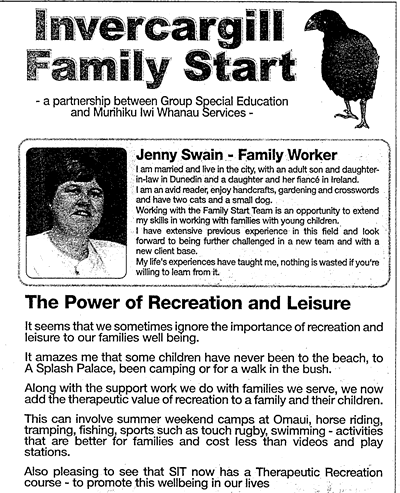|
Updated 1-8-09
The following information below is no longer valid as therapeutic recreation courses have been discontinued at Eastern Institute of Technology and Southern Institute of Technology. Gary Eckhardt was the last US lecturer at SIT in Invercargill because the programs have been discontinued. EIT ended theirs in 2007 and SIT in 2008. Glen Kastrinos was the last instructor at EIT in Napier. TR never became a recognized profession in NZ so graduates were finding jobs in other social services agencies, competing with social work graduates, etc.
================================================
Therapeutic Recreation in New Zealand (note- all information below is posted here for historical purposes... TR programs in NZ has been discontinued)
 A
bachelor’s degree in Therapeutic Recreation was initiated
in 1999 by the Eastern Institute of Technology (EIT) and in
2001 by the Southern Institute of Technology (SIT). New to New
Zealand, TR has been a recognized form of health care and human
service provision for decades in the United States and other
countries and has been embraced by SIT in the College of Health,
Exercise and Recreation as a much needed and advantageous degree
programme due to the benefits of TR in the Invercargill community
and surrounding areas. A
bachelor’s degree in Therapeutic Recreation was initiated
in 1999 by the Eastern Institute of Technology (EIT) and in
2001 by the Southern Institute of Technology (SIT). New to New
Zealand, TR has been a recognized form of health care and human
service provision for decades in the United States and other
countries and has been embraced by SIT in the College of Health,
Exercise and Recreation as a much needed and advantageous degree
programme due to the benefits of TR in the Invercargill community
and surrounding areas.
To date, all faculty come from the USA with the exception of
a new lecturer from Australia who studied Diversional Therapy
at Queensland University. Thus, a major consideration in designing
these TR curricula has been to learn and understand the NZ culture
and social systems. It is essential to ensure that TR in NZ
develops in keeping with the way of life and mores of the people
of NZ. A variety of theoretical and applied sources have been
content analysed to determine relevant socio-demographic data
and socio-cultural history and current sociological issues in
recreation and sport and human services and healthcare. Additionally,
qualitative semi-structured interviews were conducted with health
and human service providers to determine the need for and the
anticipated role of TR specialists in their agencies. The beginnings
of TR in NZ have then been examined through applying a theoretical
model similar to that of Carter, Van Andel and Robb (1995) who
analysed the early history of TR in the USA. Applying this model,
data have been collected about the formation of TR in NZ in
terms of: 1) the healthcare and human services systems, 2) the
importance of recreation, 3) the use of recreation as a rehabilitation
tool in clinical and community programmes, and 4) the implementation
of the Treaty of Waitangi. While similarities do and will exist
between the USA and NZ, projected differences based on the Kiwi
culture are emerging. Among these are strong interests in the
potential of TR among professionals working with at-risk youth
and incarcerated populations and a more entrepreneurial approach
to the delivery of TR services.
Examinations of the NZ culture and social systems and interviews
with health and human service agencies have formed an essential
basis for developing professional preparation programmes in
TR New Zealand. Comparing these data with the USA has provided
evidence for projecting the future directions of TR in NZ. Of
particular interest are the likely differences, which seem to
be emerging, and are related to Kiwi culture. A more entrepreneurial
approach to TR service delivery and working with at-risk youth
and incarcerated individuals seems likely.
EIT has graduated its first class of therapeutic recreation
specialists who are currently employed in educational, human
and health service agencies providing TR to at-risk youth, individuals
with mental illness and intellectual disabilities and rehabilitation
management services for individuals with dual diagnosis. The
first SIT students received their bachelors degrees in therapeutic
recreation in 2003.
Fran Stanat, Ph.D.Southern Institute of
Technology
Invercargill, New Zealand
ADDITIONAL RESOURCES
 ATRA's International Section ATRA's International Section
 http://www.diversionaltherapy.org.nz/ - NZ Society of Diversional Therapists Inc http://www.diversionaltherapy.org.nz/ - NZ Society of Diversional Therapists Inc
|